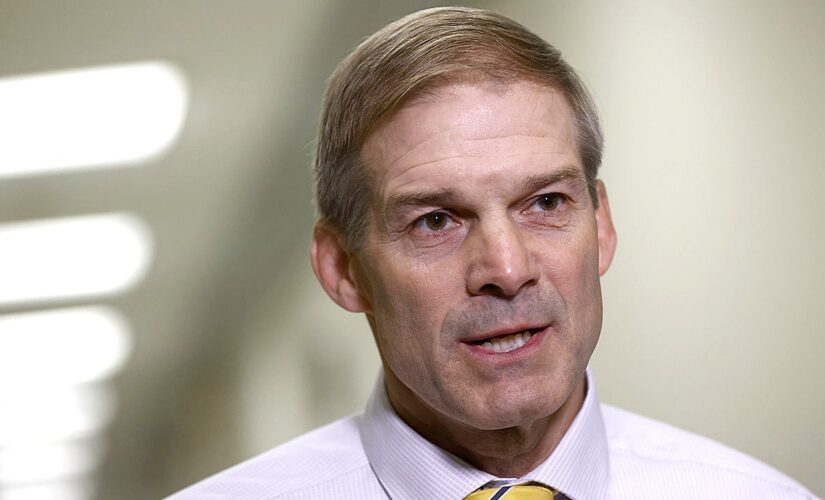A whistleblower who claims that he was tipped off to the decision in a major Supreme Court case before it was published in 2014 admitted Thursday that an incident he described in his new book “may not have” actually happened – then he was played evidence proving it did not.
During a House Judiciary Committee hearing titled, “Undue Influence: Operation Higher Court and Politicking at SCOTUS,” Rev. Robert Schenck faced questions from Rep. Jim Jordan, R-Ohio, about the circumstances surrounding a separate case involving his brother Rev. Paul Schenck.
“With a single rap of the gavel, Chief Justice William Rehnquist announced: ‘We’ll hear argument first this morning in Number 95-1056, Reverend Paul Schenck and Dwight Saunders versus Pro-Choice Network of Western New York,'” Robert Schenck wrote in his book, as Jordan showed via placards bearing the text. “Paul and I winked at each other, knowing we had made history with ‘Reverend’ in his name.”
Schenck explained at the hearing that it had been court practice not to include titles like reverend in the names of court cases, but that he and his brother made a point to include it due to the case having to do with religious liberty. Jordan then called the whole incident into question.
SUPREME COURT REJECTS CLAIM THAT ALITO LEAKED 2014 OPINION ON BURWELL V HOBBY LOBBY
Rep. Jim Jordan speaks to the press in the Rayburn House Office building in Washington, D.C., on June 4, 2021.
(Ting Shen/Bloomberg via Getty Images)
“Did Chief Justice Rehnquist really say that, the way I just read it from your book?” Jordan asked.
“Uhhhh,” Schenck replied. “I can’t say that I remember.”
“Well, you’re pretty darned specific here,” Jordan said, noting that Schenck even included the case number in his book’s account of what happened. “You made it a big deal about it’s the first time it’s ever happened, I’m just asking, did it really happen?”
“I wish I could tell, I would have to go back and review that,” Schenck said. Jordan again pressed about whether it happened, and Schenck said, “Possibly not.”
As it turned out, Jordan knew the answer, because he had an audio recording of Rehnquist from the day in question. He read a transcript and then played the recording for Schenck. Rehnquist did not say the word “reverend.”
The U.S. Supreme Court building at dusk on Capitol Hill, May 23, 2019.
(AP Photo/Patrick Semansky)
“Did you wink at your brother?” Jordan asked. Schenck said did, because it was their case. Jordan reminded him that in the book he said the wink was because of the word reverend.
Schenck was a witness at the hearing because of a letter he submitted to current Chief Justice John Roberts earlier this year. In it, he described how before the Supreme Court handed down its decision in 2014’s Burwell v. Hobby Lobby, he was contacted by one of his organization’s donors who had dinner at the home of Justice Samuel Alito, who authored opinion in that case. The donor, Schenck claimed, learned what the outcome of the case would be and told him about it.
Alito has denied leaking the decision.
ALITO SAYS LEAK OF SUPREME COURT ABORTION CASE MADE HIM A ‘TARGET FOR ASSASSINATION’
Schenck’s letter, reported on by the New York Times, noted that there was an ongoing investigation into the leak of a draft opinion in this year’s Dobbs v. Jackson Women’s Health Organization, also penned by Alito.
Supreme Court Justice Samuel Alito
(Erin Schaff/The New York Times via AP, Pool, File)
Following his grilling about Schenck’s book, Jordan called the witness’s credibility into question.
“But we’re supposed to believe you today,” Jordan said. “We’re supposed to take your word over Justice Alito’s word? We’re supposed to take your word over a lady who gave you dollars donated to your cause?”
CLICK HERE TO GET THE FOX NEWS APP
“One thing I’ve learned: people who mislead folks on small things mislead them on big things,” Jordan said.
“You know what? You can lie in a book, that’s not a crime. You can lie to the New York Times, that’s not a crime. But when you come in front of Congress, and you say things that are not true, you’re not allowed to do that.”




